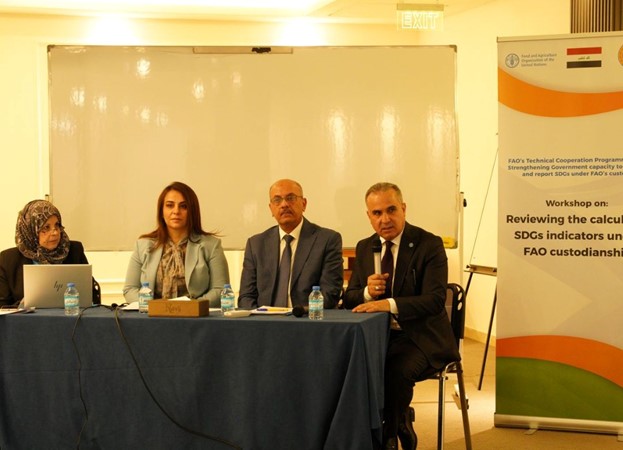Iraq strengthens capacity to monitor key SDG indicators through FAO-led workshop in Erbil

©FAO
A two-day national workshop was held in Erbil from 8 to 9 July 2025 to evaluate progress in monitoring Sustainable Development Goal (SDG) indicators under FAO custodianship. The event brought together national and regional experts, statisticians, and policymakers from the Iraqi Ministry of Planning, the General Authority for Statistics and Geographic Information Systems (ASGIS), the Kurdistan Region Statistics Office (KRSO), and the Ministry of Agriculture and Water Resources in the Kurdistan Region. The initiative was supported by the Food and Agriculture Organization of the United Nations (FAO) under its Technical Cooperation Programme (TCP).
The workshop is part of the ongoing technical cooperation programme “Strengthening Government Capacity to Monitor and Report on the Sustainable Development Goals under the Custodianship of the Organization (2024–2025)”, launched in April 2024 in partnership with the Ministry of Planning. FAO, as the custodian agency for 22 global SDG indicators, is providing technical assistance to Iraq in monitoring select indicators relevant to food security, agriculture, water resources, and women’s access to land.
Over 30 participants attended in person, with an additional 15 joining virtually, including international FAO experts and national focal points. The workshop served to review and validate calculated values for seven SDG indicators:
- 2.1.1: The prevalence of undernourishment.
- 2.1.2: The prevalence of moderate or severe food insecurity in the population, based on the Food Insecurity Experience Scale.
- 2.3.1: Volume of production per labour unit by classes of farming/pastoral/forestry enterprise size
- 2.3.2: Average income of small-scale food producers
- 5.a.2: Ensuring women’s legal rights to land ownership and/or control
- 6.4.1: Change in water use efficiency over time.
- 6.4.2: Level of water stress.
Participants assessed data quality, calculation methodologies, and consistency with international benchmarks. FAO experts provided technical feedback and presented proposals to enhance indicator monitoring and reporting systems. The workshop also approved a national roadmap for periodic SDG reporting and affirmed the importance of strengthening institutional collaboration to sustain progress.
“This workshop marks a significant step toward building a robust, transparent, and coordinated national monitoring system that aligns with global standards,” said Aqood Salman, FAO National Coordinator. “It reinforces Iraq’s commitment to evidence-based policymaking and sustainable development.”
“It is essential to maintain consistent follow-up on the necessary actions to ensure that the focal institutions in Iraq are continuously and sustainably capable of producing and reporting on these indicators, as well as the other 22 SDG indicators under FAO custodianship,” stated Mr. Firas Yassin, the Regional Statistician, during the closing session of the training.
By improving the quality and reliability of SDG data, Iraq aims to inform national planning processes, meet international reporting requirements, and accelerate progress toward the 2030 Agenda.
